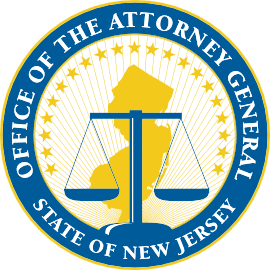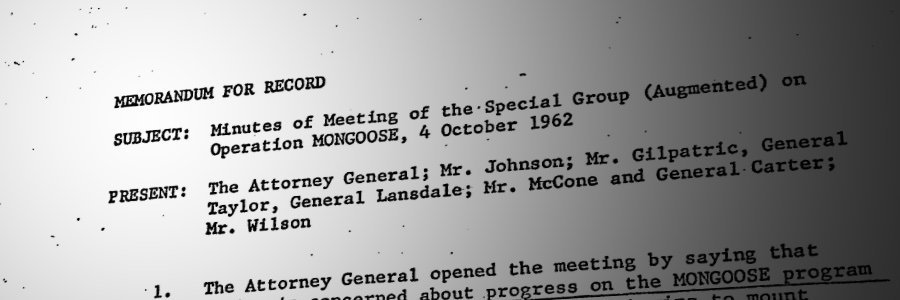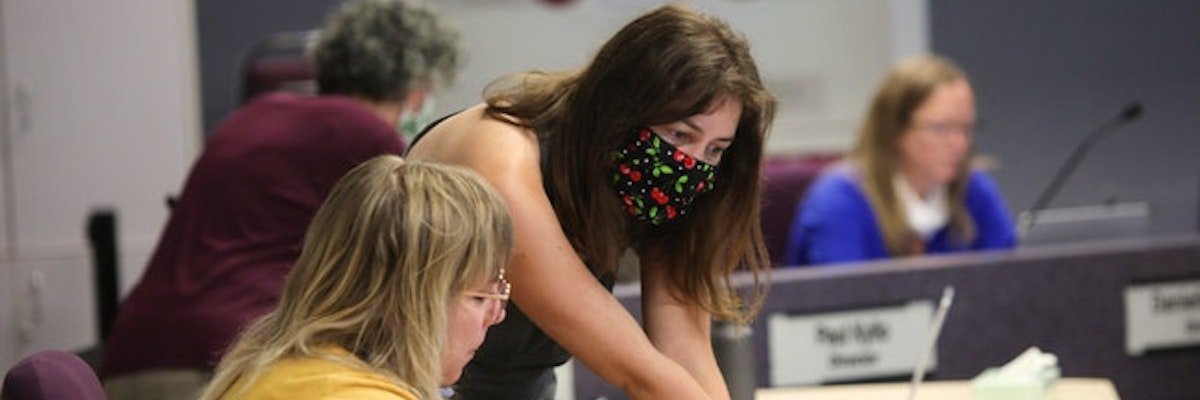Harry Scheeler filed his first records request as a New Jersey teenager in the early nineties - suspicious of the conversations police officers were having on their new and then-novel cell phones, he requested the phone bills, a move that eventually led to restrictions on their use. More recently, he’s a been a citizen vigilante requester, conducting his own audits of New Jersey’s FOI law, the Open Public Records Act (OPRA), and helping others in their records retrieval.
MuckRock first crossed paths with Harry Scheeler a year ago after a user submitted a standard request for the log of OPRA requests made to Governor Chris Christie’s office and was denied access. MuckRock submitted separate requests to each New Jersey state agency and was similarly rejected. Already on the case was Mr. Scheeler, whose plight was taken up by the ACLU. A seeming victory became stalled by the wheels of justice, when the Governor’s office requested a stay pending an appeal. The dispute carries on, even as Governor Christie announced this week that he is “happy to tell anybody everything” he knows.
Last week, MuckRock caught up with Mr. Scheeler to talk about about citizen requesting, the politicization of public records, and how you can help.
What kind of public records work do you do?
In about 2009 or 2010, I noticed that we even though we have this right to public documents — particularly in New Jersey I’m talking about — there was great resistance from the government in furnishing those documents.
When I looked into it further, a lot of the time it’s not even government employees who are interfering with this right; it’s politicians and attorneys. I never have any problems getting benign documents that don’t show anything. The fight comes when someone gives me a tip that something has been done wrong, and I go in and ask for those documents. Then the fight comes.
So what I focus on is enforcement and compliance of the law in regard to the people. I conduct routine audits of agencies. The second thing I do is people come to me, usually through my website and say, “Listen, I’m trying to get this particular record, and they’re giving me a problem.” And a lot of the time, I put the request in and they see my name and give the documents right up. But it doesn’t always work that way; sometimes I have to sue. But, you know, the point of rights are so the people can be in control of the government — that’s the way it was supposed to work. Transparency. The government is supposed to be working for the people, and in 2015, the government’s attitude is “We’re the government and you’re the citizen.”
You’ve successfully conducted audits at the State level?
I’ve audited just about every section of government you can think of. Basically what happens is if I file an OPRA request, and you as a custodian violate OPRA on something really silly and basic, like OPRA 101, I start to think to myself, “Either this person is intentionally trying to hide documents or they were improperly trained.” And a lot of times you find, unfortunately, OPRA custodians who have no idea what they were doing, who have never been to a training presentation. The Department of Education one year had three different OPRA custodians in the same year.
Every month I have to sit and read the previous cases that came out and see which way the courts are going. I have to study this stuff every month to stay on my winning streak. And the custodians have to do the same thing, because it changes from month to month, and the government just doesn’t take the responsibility very well. These employees really could care less. If they get sued, nothing happens to them. I mean, rarely does a custodian get fined.
I’ve actually caught the government flat out lying, where they withheld documents, and they said the documents didn’t exist, so I found a different government agency that had the same exact documents, filed a lawsuit and said, “Here’s proof they existed,” but they don’t get fined.
What other options does New Jersey offer before you get to the litigation stage?
You have two options. They’re both really lawsuits. One is a lawsuit through the Government Records Council, which is an administrative law proceeding. And you have council members who adopt the finding of the GRC case managers and then it goes to the Executive Director for a final court proceeding. Or you can go to Superior Court.
The GRC is good for some types of issues. If someone has given the documents but they’ve violated OPRA, or they didn’t provide documents within seven days, or they asked for an unlawful extension — anything where they broke the law but I still got the documents, I will go to the GRC and just ask for them to be held in violation.
If the entity is just absolutely refusing to turn over the documents, I will go to Superior Court, only because Superior Court is faster. The GRC can issue an order for the release of documents the same as the Superior Court can, but the GRC process takes anywhere from six to nine months, whereas you can have a court order through the Superior Court in less than ninety days.
Under OPRA, there’s a fee system statute, so if you have to use an attorney to either go to the GRC or the Superior Court, the government has to pay all of your attorney fees and court costs, and typically those cases have been averaging around $10,000. So it’s a significant cost, and I try my best to represent myself through the GRC, because ultimately the taxpayer is being punished for the bad behavior of the government. And even though the law says that a custodian can be fined for violating the law, it rarely happens. And I have plenty of examples of custodians who are absolutely defiant and the Government Records Council refuses to fine them.

There are conflicts of interest with the Government Records Council also. Any time you file a lawsuit against the State of New Jersey, the Attorney General represents the government entity. The AG also represents the Government Records Council. I have one of their decisions that’s going to the appellate court now. This case is against the Department of Education; the Attorney General’s office represented the Department of Education, and the GRC agreed with the Department of Education. Now I’m filing suit against the GRC to take the case to the appellate division. Now the Attorney General’s office is going to represent the GRC.
The other problem is that the Council members are politically appointed by the governor. And the judges that are deciding these cases are politically appointed by the governor, so the whole thing is tainted with conflicts of interest.
Can you do anything in that situation or do you have to roll with it?
A lot of activists have decided to abandon the GRC and go exclusively through Superior Court. I am refusing to do that.
I consider myself to be an expert on this area of the law, and the average person isn’t, and they don’t know when they’re getting the shaft from the GRC. I do. I have several attorneys that I use, and I can quickly deal with what they’re doing improperly, whereas the average citizen would just get turned away and not know the difference. I find that I’m obligated to try to correct this corrupt process with the GRC rather than to keep running to Superior Court.
The GRC puts out a report once a year on the statistics of the OPRA violation, but they only actually tell a fraction of the story, because those are only the people that actually went to court. My audits give the people who did not go to court a voice, and that’s what scares them.
Can you talk about the audits you’ve conducted and the OPRA log audit lawsuit that first introduced us to your work?
I started doing them on a municipal level, and then I started working on the State. The reason why I went to the State is I was actually getting bored with the local ones. The new local clerks in your towns actually know OPRA pretty well and the chances of them violating OPRA’s very slim.
What I found was that the State was horrible, and the more and more requests that I had filed with the State, the more and more problems I had to balance, so I started increasingly doing the audits. It wasn’t until I told the government what I was up to that a problem arose.
The Commissioner of Education is a member of the Government Records Council, and, personally, I believed that his OPRA requests would be all in order, because he sits on the Government Records Council. I conducted an audit of the Department of Education, and I found a significant amount of violations. And I found a significant amount of repeat violations where they were already warned either by the court or the Government Records Council that they were in violation of OPRA for doing something, and they continued to do it. It was after I sent the Commissioner of Education a strongly worded email saying that, “This is ridiculous. You guys are continuing to violate OPRA, and you’re a sitting member of the Council” — it wasn’t until then that the State said, “Well, everybody has a right to privacy. You can’t do this anymore.”
It just happened to be a tipping point when I wanted to see whether the governor was fairly and lawfully releasing records concerning Bridgegate. And the other thing is when I do find a custodian that’s breaking the law, I will make him repeat every single OPRA request that they’ve unlawfully denied other people. I make them repeat every single request that should have been released or they go to court.
And, of course, if you’re handling 200 OPRA requests for Bridgegate and you’re screwing people over left and right and now you have somebody that knows the law and knows what the rights are and he’s telling you, “No, I’m going to make you release this stuff” — you know, they had to hide them somehow.
I have no doubt that I’m going to win that case. My attorneys at the ACLU are confident that we’re going to win the case. The only thing that they have accomplished by taking the case to the appellate division is that they’re delaying release of these documents while the governor tries to run for president, because obviously anything that comes out prior to that is going to impede his progress. There may be something in there that proves either his guilt or his innocence and the problem is that if he’s already president and it comes out, it’s probably not going to matter what’s in there, even if it is really bad. Again we’re spending taxpayer money for political reasons.

What was the Bridgegate request for, exactly, and how long have you been working to get those documents?
The OPRA log is just the actual requests. So when go and you submit the [online request] form, that’s the OPRA log, you know, whatever requests are in there. That’s what I had asked for. I wanted to see what everybody was asking for and whether they were releasing it.
My request before was more broad - I just asked for all the OPRA requests. This one was narrowed down.
I had asked for all of the OPRA requests filed by anybody in the public for any documents related to Bridgegate, and then, if any of those requests were denied, I wanted a copy of the denials. Then what I do is I look at the denials and I decide based on what the law is and what my knowledge of what the case law is whether they have lawfully denied the records.
This case, I think, was filed in 2013.
And previously they had released the general OPRA log?
Right.
And as soon as you made it clear that you had a more specific interest within the OPRA log, they denied it?
I think it had more to do with my email to the Commissioner of Education who was appointed by the Governor. They knew what I was up to.
If I had been a little more secretive as to what I was up to, I probably would have been successful. But the point of what I’m doing is to influence change, and the only way to do that is to put this information in the court of public opinion and let the elected officials see the results, let the public see the results. Being secretive wasn’t really an option.
And then it seemed to be settled in your favor and then it was appealed.
The court ruled in my favor and then she issued a court order and then they filed a motion, saying that they planned to appeal and that if they had to comply with the court order, it would cause “irreparable harm.” So the judge told them — usually, in order to have that motion be successful, in which the judge issues a stay, you have to have a clear likelihood of success — and the judge basically told them, “You have no likelihood of success.” But she gave them what they wanted anyway, which is really unfortunate. So even though I have a court order, she issued a stay on her court order pending a ruling by the appellate division.
So where are we now?
I haven’t gotten a copy of their paperwork yet. They have to provide an argument for why this is legally sound. It says right on the form — and this is what the judge said — it says right on the form that these forms can be released to the public when you file the request. You don’t have any right to privacy, so I don’t know where they’re coming from when they say that someone would have a reasonable expectation of privacy when it says right on the form that they don’t.
What else is on your plate right now?
The Township of Hamilton has filed a SLAPP lawsuit against me. SLAPP stands for “strategic lawsuit against public participation.”
The police department and town hall have surveillance cameras in them and I discovered, through OPRA, that they were illegally destroying these records. The law says that they have to keep them until the state gives them permission to destroy them, and it’s done on a retention schedule. So I filed an OPRA request for all the surveillance tapes for all the cameras for thirty days. And I specifically told them, “I am going to post these on youtube and I’m going to archive them for you until you comply with the law.”
What they could have done under the law was deny the request and forced me to sue them, but that’s not what they did. They sued me. And the purpose is to cost me money. Obviously if they’re suing me, I’m going to need a defense council that costs me money. It’s kind of an intimidation tactic by the government.
Fortunately, there are laws to protect people against SLAPP lawsuits and frivolous lawsuits and my attorney has served them with a frivolous lawsuit notice. If it goes to court and the court agrees that this was a SLAPP lawsuit, then their attorney has to pay my attorney fees out of his own pocket.
But they’re spending taxpayer money to go on this pursuit to try to intimidate me, and they frankly just don’t scare me. I was a little upset to get the lawsuit, but I gave it to my attorney and they’re aggressively going after them. When I had my radio show, the Liberty Hour, this was a common theme that came up. “Aren’t you afraid of the government?” And my general answer was, “No.”
One agency that I was repeatedly asked to investigate was the Division of Youth and Family Services; now they’re called the Department of Children and Family. And I just know from the experience of being a reporter, that they do harass people and they do take people’s children for reasons other than child abuse. I have three children I have to protect, so I did have a fear of investigating that agency. When I moved out of New Jersey and down to North Carolina, I did start to investigate them, and I am in two active lawsuits with them now, where millions of dollars were paid out because they failed to protect children. And in some of these cases, children died. None of these have been reported by the media.
What I am describing is the very definition of tyranny. If people call me and say that I harass the government … well, It’s amazing to me that acts of patriotism now are called terrorism and harassment.
GW Bridge by Fly Navy via Wikimedia Commons and is licensed under CC BY-SA 2.0




